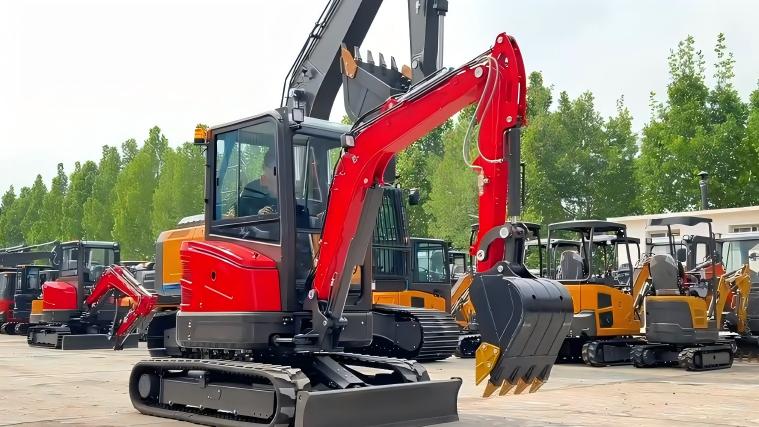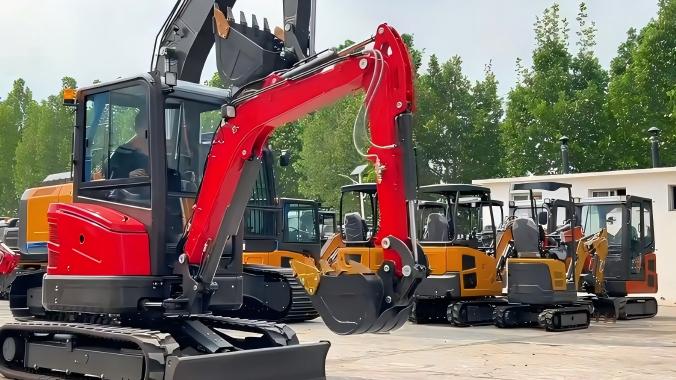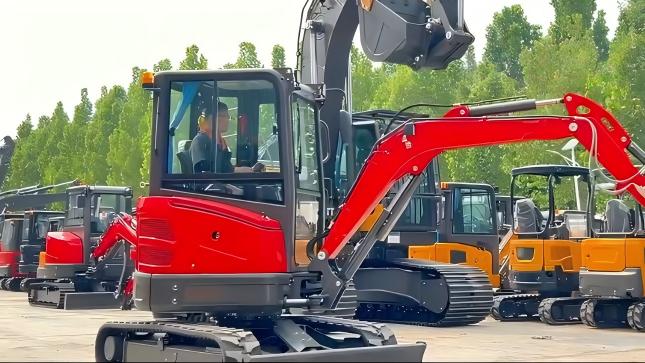Mini excavators, often seen bustling on construction sites or landscaping projects, are powerful and versatile machines. Their compact size and robust capabilities lead many to wonder: can these nimble giants also find a place in the diverse world of agriculture? The answer, unequivocally, is yes. While not replacing traditional farm equipment like tractors and combines, mini excavators offer a unique blend of precision, power, and maneuverability that makes them surprisingly well-suited for a wide array of agricultural tasks in 2025.
This article will delve into the specific applications of mini excavators in agriculture, explore their advantages and limitations in this context, discuss essential attachments, and provide insights into their cost-effectiveness for farmers.
The Agricultural Versatility of Mini Excavators
The very features that make mini excavators indispensable in urban environments – their compact footprint, zero or reduced tail swing, and precise hydraulic controls – are precisely what unlock their potential on farms. Here are some key agricultural applications:
Drainage and Irrigation Systems: One of the most critical uses for a mini excavator on a farm is in managing water. They excel at digging and maintaining:
Drainage Ditches: Essential for preventing waterlogging in fields, particularly after heavy rains. Their precision allows for consistent trench depth and slope, optimizing water flow.
Irrigation Trenches: For installing or repairing irrigation lines, including drip irrigation systems. Their ability to work in tight spaces makes them ideal for navigating around existing crops or structures.
Pond and Reservoir Maintenance: Clearing sediment, reshaping banks, and maintaining the integrity of farm ponds or small reservoirs.
Land Preparation and Improvement: Before planting or for improving existing land, mini excavators offer significant assistance:
Field Draining and Leveling: While not for large-scale plowing, they can address localized wet spots or uneven terrain.
Fence Line Preparation: Digging post holes quickly and efficiently, even in challenging soil conditions. This is a significant time-saver compared to manual methods.
Small Scale Land Clearing: Removing stumps, rocks, and small trees to prepare new areas for cultivation or expand existing fields.
Terracing and Contour Plowing: In hilly terrain, mini excavators can help create terraces or contour lines to prevent soil erosion and manage water runoff.
Livestock Management and Infrastructure: For farms with livestock, mini excavators prove invaluable:
Manure Management: Loading and spreading manure, or creating and maintaining compost piles.
Building and Maintaining Animal Pens/Enclosures: Digging foundations for barns, sheds, or creating drainage around animal housing.
Water Trough and Feeder Installation: Excavating precise holes for permanent water troughs or large feeders.
Road and Track Maintenance: Repairing farm roads, driveways, and access tracks that may have eroded over time.
Orchard and Vineyard Maintenance: In specialized agricultural settings like orchards and vineyards, mini excavators offer unique advantages:
Tree Planting and Removal: Digging accurately sized holes for planting new trees or removing old, diseased ones.
Trellis System Installation: Preparing the ground and digging holes for posts in trellising systems.
Drainage within Rows: Ensuring proper water drainage between rows of trees or vines to prevent root rot.
General Farm Utility and Maintenance: Beyond specific tasks, mini excavators serve as general utility machines:
Material Handling: Moving feed, gravel, sand, or other bulk materials around the farm using appropriate attachments.
Demolition: Dismantling old sheds, concrete pads, or other unwanted structures safely and efficiently.
Heavy Lifting: With a lifting hook or grapple, they can move heavy objects that would otherwise require manual labor or a larger, less maneuverable machine.
Digging Root Vegetables: While specialized harvesters exist, for smaller plots or specific root crops, a mini excavator with a specialized bucket can carefully loosen soil for easier harvesting.
Advantages of Mini Excavators in Agriculture
Maneuverability in Tight Spaces: Their compact size allows them to navigate narrow rows, between buildings, and through gates where larger equipment cannot go.
Precision Control: Hydraulic controls enable precise digging and lifting, minimizing damage to surrounding crops or infrastructure.
Reduced Ground Compaction: Compared to larger, heavier machinery, mini excavators exert less ground pressure, which is beneficial for soil health, especially in sensitive areas.
Versatility with Attachments: A wide range of quick-hitch attachments transforms the mini excavator into a multi-purpose tool, increasing its value.
Lower Operating Costs (relative to larger equipment): Generally, mini excavators consume less fuel and have lower maintenance costs than full-sized excavators or large tractors.
DIY Capability: Many farm owners can operate a mini excavator with basic training, reducing reliance on external contractors for smaller jobs.
Limitations to Consider
While highly versatile, mini excavators do have limitations in agricultural settings:
Scale of Operations: They are not suitable for large-scale field plowing, harvesting vast acreages, or moving enormous volumes of earth. For such tasks, traditional farm tractors and specialized implements are necessary.
Limited Towing Capacity: Unlike tractors, mini excavators are not designed for towing heavy trailers or implements across fields.
Speed: They are slower than tractors for covering large distances or performing wide-area tasks.
Specialized Harvesting: For most commercial crop harvesting, dedicated harvesting machinery is far more efficient.
Essential Attachments for Agricultural Use
The true power of a mini excavator in agriculture lies in its ability to utilize a variety of attachments:
Digging Buckets: Various sizes for trenching, digging, and general excavation.
Grading/Ditching Buckets: Wider, flatter buckets ideal for shaping ditches, grading, and backfilling.
Augers: For drilling precise post holes for fencing, planting, or building foundations.
Hydraulic Breakers/Hammers: For breaking up rock, concrete, or frozen ground.
Grapples: Essential for moving brush, logs, rocks, and demolition debris.
Thumbs (Mechanical or Hydraulic): Greatly enhance the machine's ability to pick up and manipulate irregular objects.
Rakes: For clearing brush, debris, and leveling soil.
Flail Mowers/Brush Cutters: For clearing overgrown areas or maintaining borders.
Pallet Forks: For lifting and moving palletized goods around the farm (though stability is a consideration).
Cost-Effectiveness for Farmers in 2025
For many farmers, investing in a mini excavator in 2025 can be a highly cost-effective decision. Instead of hiring external contractors for every digging or clearing job, owning a mini excavator provides on-demand capability. This saves both time and money in the long run. Used mini excavators, in particular, offer an excellent entry point for farmers on a budget, providing significant utility for a lower initial investment. Rental options are also viable for one-off projects or to test the machine's utility before committing to a purchase.
Conclusion
A mini excavator is far more than just a construction tool; it is a valuable asset that can significantly enhance productivity and efficiency on farms of various scales in 2025. Its ability to perform precise digging, handle diverse materials, and operate in confined spaces makes it an indispensable machine for everything from drainage and land preparation to livestock management and orchard maintenance. While it won't replace the core functions of a tractor, a mini excavator acts as a powerful complement, offering unparalleled versatility for numerous tasks, ultimately contributing to a more efficient, sustainable, and profitable agricultural operation.
Post time:Sep-25-2020



